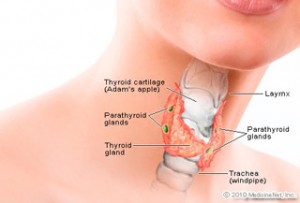 The thyroid gland is one of the most important glands in the body. It produces the hormones that regulate the body’s metabolism. There are two primary hormones that this gland produces, T3 and T4. These hormones are important because they affect the conduct of every single cell in the human body; therefore, it is not difficult to see why thyroid function must be in proper working order.
The thyroid gland is one of the most important glands in the body. It produces the hormones that regulate the body’s metabolism. There are two primary hormones that this gland produces, T3 and T4. These hormones are important because they affect the conduct of every single cell in the human body; therefore, it is not difficult to see why thyroid function must be in proper working order.
Thyroid Function – What Does This Gland Do?
The thyroid is part of the endocrine system, which is made up of glands that produce, store, and release hormones into the bloodstream so the hormones can reach the body’s cells. It is common knowledge that the human body utilises carbohydrates and fats to supply itself with the energy it needs. The amount of and manner in which the body utilises energy affects everything from one’s heart rate to its production of proteins. T3 and T4 travel in your bloodstream to reach almost every cell in the body. Thyroid hormones regulate metabolism. An additional thyroid function that this gland is responsible for is the production of calcitonin. This particular hormone is the one that monitors and controls the amount of calcium a person has in their bloodstream. The rates at which T3 and T4 are released into the bloodstream are controlled by the hypothalamus and the pituitary gland.
The hypothalamus sends a signal to the pituitary gland when it needs to make more thyroid stimulating hormone (TSH). The particular amount that is needed is dependent upon exactly how much T3 and T4 are in the bloodstream. If there aren’t enough of the two hormones in the bloodstream, then TSH levels will be too high. If there’s too much of the two, then TSH levels will be low. The thyroid gland determines how many hormones it should make based upon how high/low the TSH levels are.
If the TSH levels in the bloodstream are off, then it is going to negatively affect the hormone production of the thyroid gland and thyroid function will not be operating at peak capacity. When the thyroid is not functioning properly, it upsets the entire chemical balance of the human body. If the thyroid produces an excess of hormones, the condition is referred to as hyperthyroidism. If it is not producing enough hormones, the condition is called hypothyroidism.
While both conditions can affect a person’s quality of life, the good news is that they are both readily treatable. In most instances, their effects can be controlled through daily medication. A doctor will know what tests to conduct. They will discuss the results with their patient and decide on an appropriate course of treatment. Within a few weeks, it is guaranteed that a patient will be feeling better.
If you have questions or concerns about thyroid problems see your local doctor who will arrange for you to see a thyroid surgeon.
